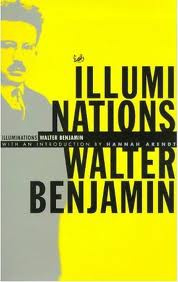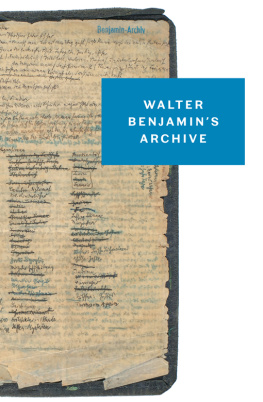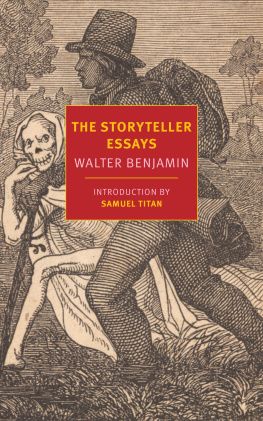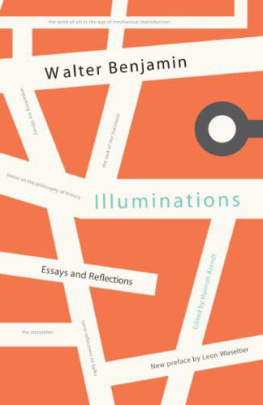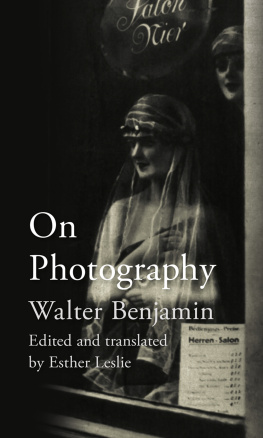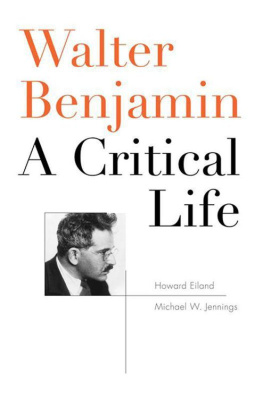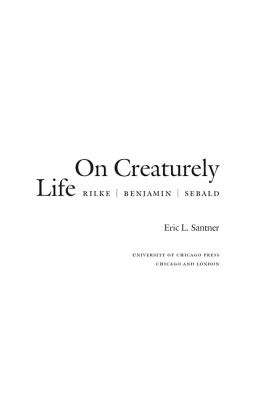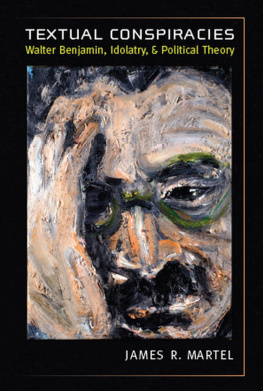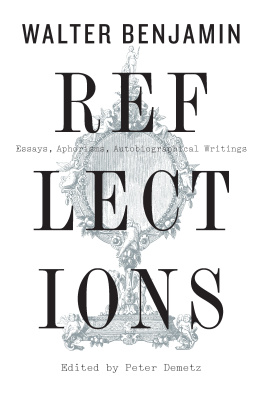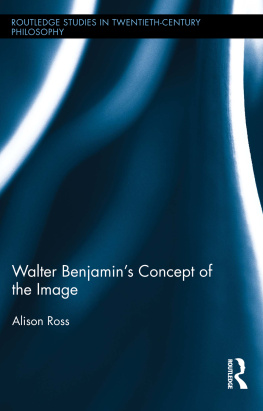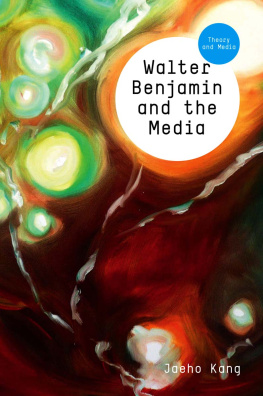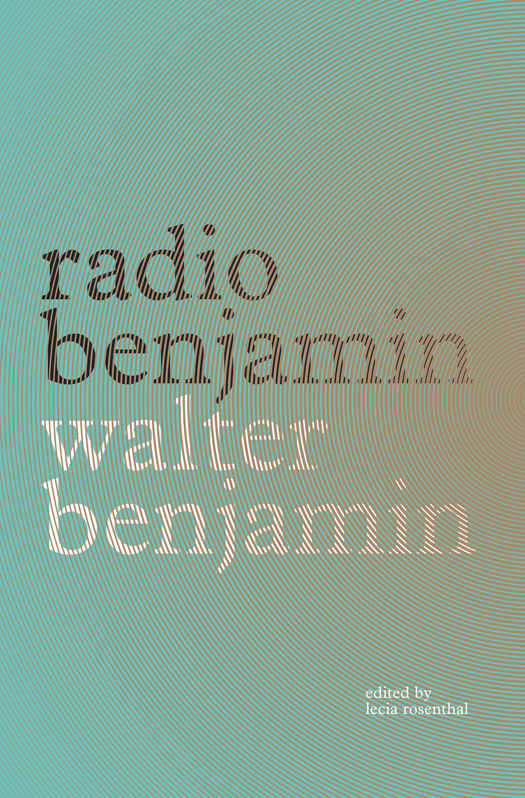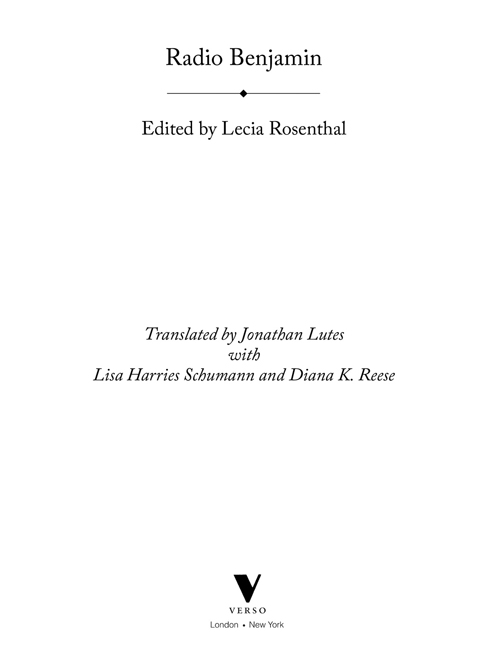First published by Verso 2014
Translation Jonathan Lutes, Lisa Harries Schumann and Diana K. Reese 2014
Introduction Lecia Rosenthal 2014
Translated works originally appeared in Gesammelte Schriften , 7 vols.
Suhrkamp 1972-1989
All rights reserved
The moral rights of the authors have been asserted
Verso
UK: 6 Meard Street, London W1F 0EG
US: 20 Jay Street, Suite 1010, Brooklyn, NY 11201
www.versobooks.com
Verso is the imprint of New Left Books
eBook ISBN-13: 978-1-78168-576-1 (US)
eBook ISBN-13: 978-1-78168-701-7 (UK)
Hardcover ISBN-13: 978-1-78168-575-4
British Library Cataloguing in Publication Data
A catalogue record for this book is available from the British Library
Library of Congress Cataloging-in-Publication Data
Benjamin, Walter, 1892-1940.
[Broadcasts. Selections. English]
Radio Benjamin / edited by Lecia Rosenthal ; tanslated by Jonathan Lutes, Lisa Harries
Schumann and Diana Reese.
pages cm
Includes bibliographical references and index.
ISBN 978-1-78168-575-4 (hardback)
1. Benjamin, Walter, 18921940Translations into English. I. Rosenthal, Lecia, editor.
II. Title.
PT2603.E455A26 2014
838$.91209dc23
2014025632
v3.1
Contents
Abbreviations and a Note on the Texts
GS Gesammelte Schriften , 7 vols., with supplements, eds. Rolf Tiedemann, Hermann Schweppenhuser et al. (Frankfurt: Suhrkamp, 19721989).
SW Selected Writings , 4 vols., ed. Michael W. Jennings et al. (Cambridge, MA: Harvard University Press, 19962003).
Translations in this volume are based on Benjamins radio typescripts as published and edited in the Gesammelte Schriften . Information about individual broadcasts, including dates and location, are provided in a section following each translation, just above the notes. Unless otherwise indicated, all translations, including translations of texts cited by Benjamin, are by the translators. The editor of this volume is indebted to the editors of the Gesammelte Schriften ; the notes to the translations in this volume borrow from and expand upon their work.
The editor would like to thank a number of friends and colleagues who supported this project along the way: Joseph Massad, Martin Harries, Virginia Jackson, Jonathan Zittrain, Andrew Rubin, Jacqueline Loss, Andrew Coletta, Chris Coletta, Gayatri Chakravorty Spivak, Andrew Magliozzi, Berit Schlumbohm, Till Jesinghaus, and Ryan Shiraki. Ursula Marx at the Benjamin Archive in Berlin was especially helpful, as was Thomas Kpper, who, as co-editor along with Anja Nowak of the volume devoted to Benjamins radio works in the forthcoming German new critical edition, Werke und Nachla , shared invaluable information as well as his excitement about the project. I would also like to thank the translators, Jonathan Lutes, Lisa Harries Schumann, and Diana Reese, for their hard work. I am grateful to them for allowing me to work closely with them on the translations, for being so open to my queries, and for their thoughtful contributions to conversations about the volume as a whole. To Jonathan Lutes, who was a collaborator from the start, I owe particular thanks. It was because of his encouragement and enthusiasm that the idea for the volume took off. Lisa Harries Schumann generously agreed to join the project midway, and without her contributions it would not have been completed. At Verso, Mark Martin and Lorna Scott Fox expertly guided the books final stages. I am indebted to them and to Sebastian Budgen, who supported the project from the beginning.
Walter Benjamin on the Radio: An Introduction
Lecia Rosenthal
Unpredictable and wide-ranging, the power of Benjamins work has registered in its generative, cross-disciplinary effects. Widely associated with his writings on photography, as well as his contributions to fields including film, architecture, Jewish theology, Marxism, translation studies, and studies of violence and sovereignty, Benjamin is far less well-known for his contributions to the early history of radio.
From 1927 to early 1933, Benjamin wrote and delivered some eighty to ninety broadcasts over the new medium of German radio, working between Radio Berlin and Radio Frankfurt.broadcasts, many of them produced under the auspices of programming for children, cover a fascinating array of topics: typologies and archaeologies of a rapidly changing Berlin; scenes from the shifting terrain of childhood and its construction; exemplary cases of trickery, swindle, and fraud that play on the uncertain lines between truth and falsehood; catastrophic events such as the eruption of Vesuvius and the flooding of the Mississippi River, and much more. In addition to the radio talks and plays specifically produced for children, Benjamin delivered a variety of pieces on subjects from practical advice on how to manipulate the boss, and the rhetoric of self-help and self-promotion (A Pay Raise?! Whatever Gave You That Idea!), to Enlightenment debates on literary taste and the popularization of reading practices ( What the Germans Were Reading While Their Classical Authors Were Writing ). In the radio play Lichtenberg , Benjamin places various apparatuses of surveillance in the hands of moon beings, externalized, otherworldly figures who stand in judgment, not unlike omniscient narrators (and, Benjamin suggests, followers of psychoanalysis), over the human capacity for unhappiness. And these are only some of the texts that we find among Benjamins total output for radio.
Most of Benjamins works for radio have never before been translated into English. Radio Benjamin presents, for the first time, a collection in English devoted specifically and entirely to Benjamins work in this medium. Section I presents the surviving texts of Benjamins radio stories for children, the talks he wrote and delivered for the Youth Hour on Radio Berlin and Radio Frankfurt. Section II includes the two radio plays Benjamin wrote for children, Much Ado About Kasper and The Cold Heart (the latter co-written with Ernst Schoen). Section III comprises selections from Benjamins literary radio talks, his lectures and readings as well as the surviving texts of radio dialogues and Hrmodelle , or listening models, along with two radio plays not written specifically for childrens programming. Finally, Section IV presents selections from Benjamins writings on radio that were not written for broadcast or delivered on air.
Interrupted Reception
Despite their thematic and formal richness, and notwithstanding the seemingly inexhaustible interest in all things Benjamin, the radio works have received surprisingly little critical attention. Even as Benjamin continues to be known and anthologized for his pioneering study of the effects of technologies of reproduction on the experience, consumption, and understanding of the work of art, his contributions to the early history of radio broadcasting and his thinking on the subject remain relatively ignored or underrepresented in discussions of his legacy, as well as in debates surrounding the last centurys proliferation of new media, and of sound media in particular. Faced with this material, we might well ask how such works could have remained so obscured, or, to use a more media-specific metaphor, so comparatively unheard. I shall address this question through two speculative explanations, one related to the history of the medium and to the archival conditions of Benjamins radio work, the other biographical. In the process, we will follow the publication history of the radio materials, picking up on the interferences that have contributed to their interrupted reception along the way.



